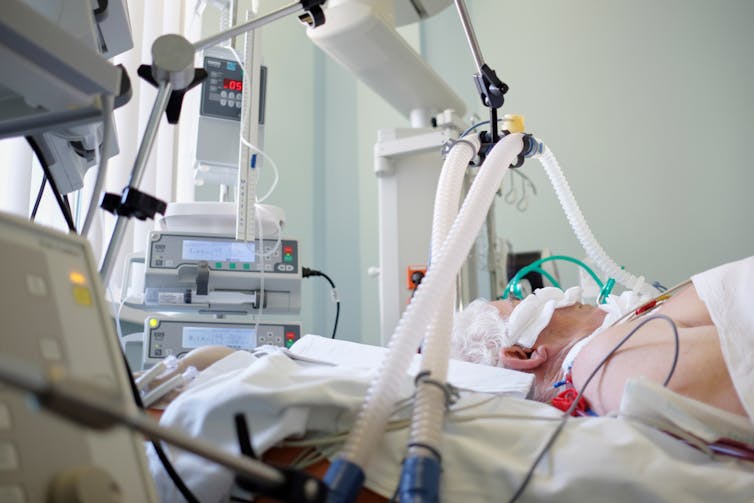 Jamie Hartmann-Boyce, University of Oxford
Jamie Hartmann-Boyce, University of Oxford
With the US president, Donald Trump, testing positive for coronavirus, speculation has begun regarding possible outcomes. The reality is, it’s impossible to say for certain what will happen to an individual once they’ve contracted COVID. Some people may have no symptoms at all, while others may have far worse outcomes. It’s one of the many mysteries of the virus that scientists worldwide are working around the clock to untangle.
When it comes to risk, there are some things we do know, but many that remain uncertain. There are also some things we can change and some that we’re stuck with. It’s now common knowledge that age is the most important factor driving the risk of worse outcomes from COVID. Being male, living with obesity, being from a non-white ethnic group and having long-term conditions – such as diabetes and heart disease – also increase risk.
The increased risk with age is striking – people 80 and older are estimated to be 70 times more likely to die than those under 40. In the UK, being aged 70 or older classes people as clinically vulnerable, or moderately at risk. In the USA, eight out of every ten deaths attributed to COVID have been of people 65 and older.
By contrast, obesity is estimated to increase risk of death from COVID by almost 50%, and type 2 diabetes is estimated to double the risk.
These are only the headline factors – different medications may affect risk, as may a host of other factors which will vary from person to person and include things such as viral load, meaning how much of the virus a person is exposed to in the first place.

Linked to many of these risk factors is also the key, but complex, issue of socioeconomic status – with people from less advantaged groups suffering a disproportionate burden of COVID disease and death.
Some of the above risk factors are non-modifiable, which means, essentially, we’re stuck with them. You can’t change how old you are. The good news, however, is that action can be taken to address some of the others. Raised body weight, for example, is driven by a complex system of socioeconomic, commercial, environmental and genetic factors, but governments can roll out policies to help address some of these. There are also evidence-based methods available to support healthy weight loss.
Being wealthy is healthy
When covering Trump’s risk factors, one is less spoken of but weighs heavily in his favour – his socioeconomic status. People from less-advantaged groups are at greater risk from COVID.
If one teases this out, the health benefits of higher socioeconomic status turn out to be down to a number of factors, including a lower risk of contracting the disease in the first place (often linked to socioeconomic factors such as occupation or where you live). Other factors at play include the presence and treatment of underlying health conditions, the relative risk of exposure to air pollution and other environmental threats to health – and, crucially, access to healthcare.
For people with the most severe forms of COVID, treatment with the drug dexamethasone can reduce risk of death by up to one-third. Socioeconomic status is one of the factors determining who gets the best treatment for COVID, particularly in countries where there is no universal healthcare – including the US.
When the UK’s prime minister, Boris Johnson, contracted COVID this year, it was described as a wake-up call, particularly in regards to obesity. The prime minister himself has raised body weight as an issue, and attributes his severe infection to that risk factor.
It remains to be seen how Trump reacts, both physically and politically, to his own infection. There is no doubt that, due to his position, he will be receiving every aspect of healthcare he could wish for. By contrast, millions of Americans cannot access basic care, including access to essential medications such as insulin for type 1 diabetes (Trump recently asserted insulin is priced as cheaply as water, which unfortunately is far from true), let alone intensive care during the acute phase of a pandemic.
While the press focuses on the risk factors that may put Trump at greater risk of severe infection, we should not forget those modifiable and strikingly inequitably distributed factors which work in his favour. Focus should be not only on treating the virus, but on mending the broken system that has allowed it to claim the lives of 207,000 Americans and counting.![]()
Jamie Hartmann-Boyce, Senior Research Fellow, Departmental Lecturer and Co-Director of Evidence-Based Healthcare DPhil programme, Centre for Evidence-Based Medicine, University of Oxford
This article is republished from The Conversation under a Creative Commons license.


















